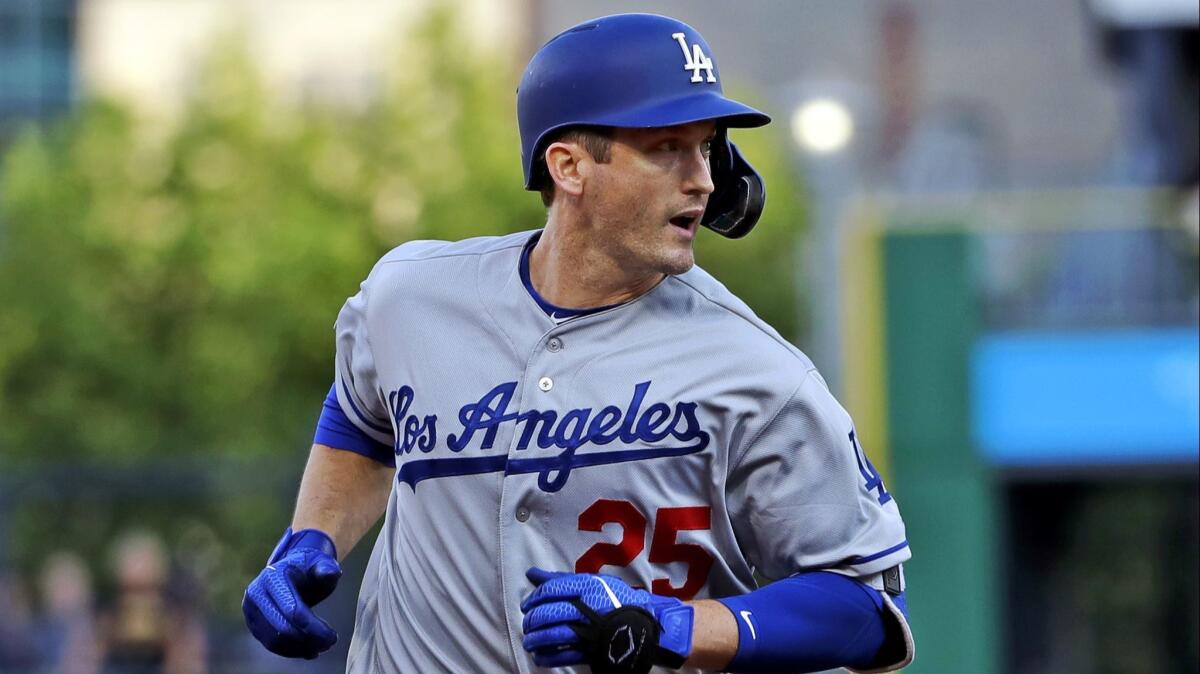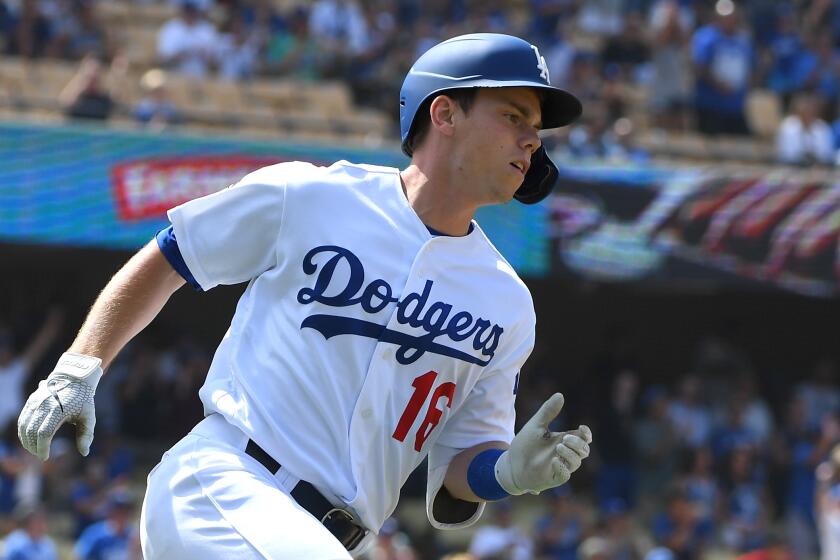Dodgers veteran David Freese leads with a measured voice and thunderous bat

David Freese was convinced retirement was next.
He was prepared to quietly vanish from the baseball map — no announcement, no hoopla, just the way he liked it — after the Dodgers lost Game 5 of the World Series last year, and end a memorable career with 2011 World Series and National League Championship Series most-valuable-player awards, a 2012 All-Star appearance, and several clutch moments people in his hometown of St. Louis will never forget. His body was knackered and he knew the prospective free-agent market for a corner infielder in his mid-30s was barren. He was at ease with leaving baseball behind.
Those plans changed while the Boston Red Sox sprayed champagne and chugged beer at Dodger Stadium.
“Bring this guy back.”
Those were Justin Turner’s first words to Dodgers president of baseball operations Andrew Friedman in the somber aftermath. Others contributed to the chorus. The message was clear.
Freese and Friedman spoke that night. They discovered a deep mutual interest in a reunion and decided to hasten the process. It was Sunday. By the end of the week, the sides agreed to a one-year, $4.5-million contract plus a $500,000 buyout. The Dodgers saved $1 million. Freese was thrilled.
“I came back because this was everything I wanted to be a part of,” Freese said. “And it was worth another year to get up for 180 games and just get after it.”
Freese, 36, embodies the kind of player the Dodgers covet. He is open to unconventional use and produces when called upon. He has excelled in his platoon role since the Dodgers acquired him from the Pittsburgh Pirates right before the Sept. 1 waiver trade deadline last year.
Will Smith, Gavin Lux, Matt Beaty, Dustin May and Tony Gonsolin were in the minors much of the season, yet could be integral to the Dodgers’ playoff fortunes.
And in just two months last season, he became a revered teammate, emerging as a soft-spoken clubhouse leader. Younger Dodgers picked his brain, digging into his steep experiences on and off the field, which include battling depression and alcohol abuse. They observed his preparation, how he always seemed prepared to inflict damage in his limited opportunities. He was a seamless fit.
“The ability to be that presence in the clubhouse, have the pedigree that he has, is huge,” Turner said. “The long list of experiences and success is just a value you want to have around. He’s a winner. You talk about culture in the clubhouse and creating a winning culture, that’s the guy you want to be here to help establish that.”
Freese returned as the Dodgers’ first baseman against left-handed pitchers. Playing time was spare when he wasn’t spending six weeks on the injured list. He stayed sharp by avoiding excess exertion. His preparation isn’t very mechanical. He has taken batting practice on the field, by his count, fewer than five times the last couple of years. Instead, he tries to visualize everything. He feels freer that way.
The formula produced a .315 batting average with 11 home runs and a 1.002 on-base-plus-slugging percentage in 79 games. He’ll continue as the Dodgers’ part-time first baseman in the postseason, splitting duties with Max Muncy.
“We’ve all marveled at how easy he’s made hitting look,” Friedman said.
Off the field, his willingness to take a backseat to others, teammates explained, set an example as the Dodgers continued moving players around to maximize wins. He replaced Chase Utley as the team’s sage and utility man Enrique Hernandez’s mentor. Some nights, the two just hang out after games, watching MLB Network, discussing baseball and life until 2 a.m.
“There’s something about his voice,” Hernandez said. “He doesn’t talk much, but when he does talk, you want to listen.”
Freese believes this is the most talented team he’s ever played on, a list that includes the 2011 World Series champion St. Louis Cardinals. He knows, for sure, this is the most fun he’s ever enjoyed as a major leaguer. But all signs, again, point to him retiring when this Dodgers pursuit of their first World Series title since 1988 is over. Unless, of course, something changes.
“It still feels surreal that I’m even here a year later,” Freese said. “I’m just really grateful. It’s become kind of a cliche word, but I am really grateful to the people on this team.
“It’s just, man, it’s just a hell of a good time being a Dodger.”
More to Read
Are you a true-blue fan?
Get our Dodgers Dugout newsletter for insights, news and much more.
You may occasionally receive promotional content from the Los Angeles Times.










